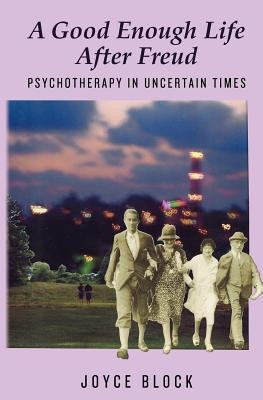| A Good Enough Life After Freud: Psychotherapy in Uncertain Times Contributor(s): Block, Joyce (Author) |
|
 |
ISBN: 1461185351 ISBN-13: 9781461185352 Publisher: Createspace Independent Publishing Platform OUR PRICE: $19.00 Product Type: Paperback Published: August 2011 |
| Additional Information |
| BISAC Categories: - Psychology | Psychotherapy - General |
| Physical Information: 0.73" H x 5.24" W x 7.99" (0.82 lbs) 326 pages |
| Descriptions, Reviews, Etc. |
| Publisher Description: Through a close examination of the stories that people bring to psychotherapy, Joyce Block, Ph.D. explores the ethical and philosophical conflicts that underlie their symptoms and emotional upheavals. In the protected space of the therapeutic encounter, where all forbidden and irrational thoughts and feelings are permissible, therapist and patient grapple with the age-old questions of what to hope for, how much to settle for, and how to live. Ours are uncertain times, however, and the traditional ideals that used to serve as moral compasses -- self-reliance, forgiveness, sacrifice and love for one's neighbor -- are being re-examined and turned inside out. As the purpose and value of suffering and individual self-fulfillment are alternately defended and challenged by patient and therapist, the reader is invited to reconsider what it means to live creatively and ethically, honestly and generously; in other words, what it really means to live well. Although psychotherapists are generally presumed to be objective third parties, and unlike religious counselors are not supposed to impose their values upon their patients, Joyce Block describes how she and other therapists with different psychotherapeutic orientations wrestle with this impossible ideal. Indeed, there are as many competing versions of how to do good therapy as there are competing versions of what is essential for human flourishing. Once contradictory values are exposed to light and given voice, the meaning of health and happiness unravels and then becomes reconfigured. In this kaleidoscopic process, the therapeutic relationship serves as a microcosm of how to respond to the uncertainties of modern life. A Good Enough Life After Freud offers no simple solutions to either patients, therapists, or readers, but insists that hope resides in our willingness to heighten our understanding and embrace our complexity. This is Freud's legacy and the ever-renewable possibility for living a good enough life. |